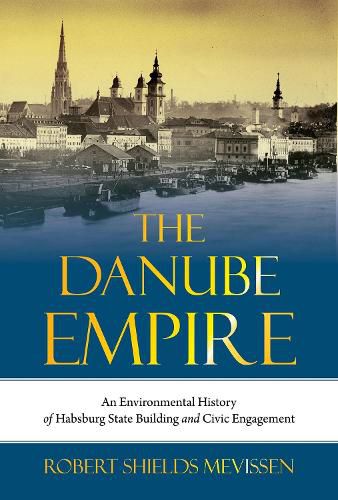Readings Newsletter
Become a Readings Member to make your shopping experience even easier.
Sign in or sign up for free!
You’re not far away from qualifying for FREE standard shipping within Australia
You’ve qualified for FREE standard shipping within Australia
The cart is loading…






In the nineteenth century, changes to the environment, driven by ideology, natural forces, and burgeoning fossil fuel power, shifted the course of the Habsburg Empire. Along the Danube-Europe's second longest river-hydraulic engineering projects ranging from bridges to embankments and shipping hubs affected the river's dynamics, as did new activities related to trade, industrialization, sanitation, recreation, and agriculture. Taking a unique environmental perspective to explore questions of transnational solidarity and identity, The Danube Empire argues that the Danube River served as both a catalyst and a tool for institution building. Drawing on primary sources in German and Hungarian, Robert Shields Mevissen reconstructs how various communities throughout the empire viewed and shaped river engineering works as a means to promote material wellbeing and economic vitality. As they negotiated their conflicting and overlapping interests, they engaged government at all levels, from the imperial to the local, through democratic and civic avenues. Offering new insights into the state's normative development and robust civil society, Mevissen shows how an empire, in reshaping a river, reshaped itself.
$9.00 standard shipping within Australia
FREE standard shipping within Australia for orders over $100.00
Express & International shipping calculated at checkout
Stock availability can be subject to change without notice. We recommend calling the shop or contacting our online team to check availability of low stock items. Please see our Shopping Online page for more details.
In the nineteenth century, changes to the environment, driven by ideology, natural forces, and burgeoning fossil fuel power, shifted the course of the Habsburg Empire. Along the Danube-Europe's second longest river-hydraulic engineering projects ranging from bridges to embankments and shipping hubs affected the river's dynamics, as did new activities related to trade, industrialization, sanitation, recreation, and agriculture. Taking a unique environmental perspective to explore questions of transnational solidarity and identity, The Danube Empire argues that the Danube River served as both a catalyst and a tool for institution building. Drawing on primary sources in German and Hungarian, Robert Shields Mevissen reconstructs how various communities throughout the empire viewed and shaped river engineering works as a means to promote material wellbeing and economic vitality. As they negotiated their conflicting and overlapping interests, they engaged government at all levels, from the imperial to the local, through democratic and civic avenues. Offering new insights into the state's normative development and robust civil society, Mevissen shows how an empire, in reshaping a river, reshaped itself.